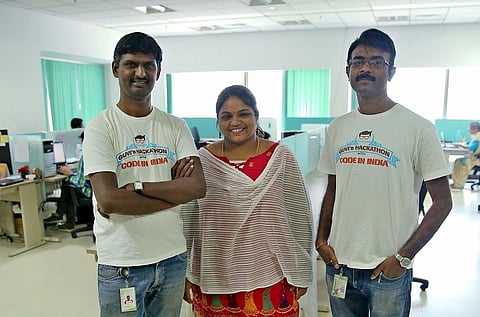

Chennai-based techies, SP Balamurugan, Sridevi and Arun Prakash, were working at PayPal in 2011, when they noticed that there were many talented people around them whose only barrier on the path to achieving professional success was that they weren’t well-versed in English. The language is the medium of instruction for most engineering and technology courses, so with a little help from friends, the three of them started a YouTube channel with tutorials in native languages and christened it ‘GUVI’.
GUVI stands for ‘Grab Your Vernacular Identity’ and provides aspiring technologists with video tutorials, courses and practice material in their own language. It began as a self-learning initiative but has now grown into a platform which not only provides full-fledged college courses with assignments, but also has videos in Tamil, Kannada, Telugu and Hindi.
While the videos can be accessed by creating an account on their website, the courses and practice platforms like online code compiler require payment. Balamurugan says that they have also tied up with colleges in Chennai and Coimbatore – 13 of which have bought GUVI’s courses for their students. 52 others have students enrolled for courses on a voluntary basis.
GUVI is not only helping people learn but aiding them in finding employment too. In 2014, GUVI placed more than 50 people in startups and MNCs. “Employers began approaching us when they realized that we were good with what we did,” says Balamurugan. GUVI works by awarding points to users who practice and finish courses on its platform. These performance profiles also help employers in finding the right people for the jobs that they are offering, Balamurugan adds.
Balamurugan says that they are currently focusing on Tamil.
But how did GUVI go from being a vernacular video hub to an online learning and recruitment platform?
Balamurugan says that the turning point was their pitch in IIT Madras in 2014, following which GUVI was incubated as a startup and became associated with the QEEE project which aims to teach Python, a computer programming language, to 150 colleges in India in their mother tongues.
By June 2014, the trio had quit their jobs in PayPal and registered GUVI as a company. And while they assumed in the beginning that GUVI would mostly appeal to rural audiences, they were quite surprised when students from cities and towns also began using their platform. “The feedback we got indicates that they connected more with the content in their native language and engaged more actively with it,” Balamurugan explains.
However, the team realized that if they wanted to become a sustainable business model, they needed to involve educational institutions. That’s when they held boot camps in 10 colleges, and created courses, complete with assignments and advanced levels, along with the web platform which allowed users to practice.
The text in their videos is in English, however, the voiceover is provided by industry professionals in native languages. These voiceovers were initially given by their colleagues at PayPal but now, they have plenty of industry professionals approaching them to help. “We usually hold a mock session with them in one of the colleges we have tied up with to see if they are good teachers. In case the professional cannot be physically present, we provide them with a video and ask them to record a voiceover to see if they can explain things well,” says Balamurugan.
While they deal primarily in computer engineering courses, they have introduced a few courses in mechanical engineering recently.
“We want to continue to bridge the gap between knowledge and talent which is created by language. Because it can be bridged by language too,” states Balamurugan.